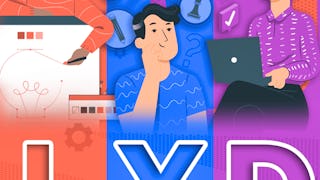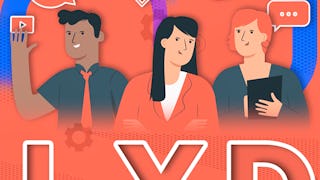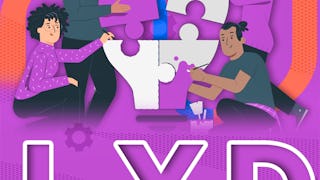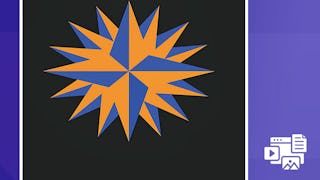In Theories and Frameworks, you’ll take a close look at learners and learning contexts. As you define your target audience, you’ll learn how to use learner personas as a communication tool with stakeholders and how these can be used to influence learning goals, assessments, and activities.

Profitez d'une croissance illimitée avec un an de Coursera Plus pour 199 $ (régulièrement 399 $). Économisez maintenant.

Learning Experience Design: Theories and Frameworks
Ce cours fait partie de Spécialisation An Introduction to Learning Experience Design (LXD)
Enseigné en Français (doublage IA)


Instructeurs : Rebecca Quintana, PhD
3 815 déjà inscrits
Inclus avec
(36 avis)
Ce que vous apprendrez
Analyze learner needs and learning contexts
Implement taxonomies and theories for design
Align learning outcomes with course outlines
Compétences que vous acquerrez
- Catégorie : Design
- Catégorie : Communication
- Catégorie : Prototyping
- Catégorie : Brainstorming
- Catégorie : Creative Thinking
- Catégorie : Learning Theory
- Catégorie : Course Development
- Catégorie : Needs Assessment
- Catégorie : Motivational Skills
- Catégorie : Student-Centred Learning
- Catégorie : Instructional Design
- Catégorie : Analysis
Détails à connaître

Ajouter à votre profil LinkedIn
Découvrez comment les employés des entreprises prestigieuses maîtrisent des compétences recherchées

Élaborez votre expertise du sujet
- Apprenez de nouveaux concepts auprès d'experts du secteur
- Acquérez une compréhension de base d'un sujet ou d'un outil
- Développez des compétences professionnelles avec des projets pratiques
- Obtenez un certificat professionnel partageable

Il y a 4 modules dans ce cours
In Week 1 of the course, you’ll focus on developing a vision of the learner and of the learning context. You’ll revisit ideas from learner-centered design and the “designing for all learners” mindset we discussed in course one. Using a design process frame, you’ll consider the kinds of information you need to gather about your learner audience and context and identify approaches for analyzing this information. Finally, you’ll explore the role of learner personas in aiding decision making with project stakeholders.
Inclus
5 vidéos10 lectures2 devoirs1 élément d'application3 sujets de discussion
In Week 2 of the course, you’ll focus on different theories and perspectives on learning, and consider ways that these theoretical ideas can inform learning experience design. You will review ideas from overviews of three major learning theories: Behaviorism, Cognitivism, and Constructivism. You will note how different learning theories lead to different ideas about what constitutes learning, and what kind of activities can support learning. You will also look at some perspectives and theories about motivation. You will review ideas about extrinsic and intrinsic motivation, and review Self-Determination Theory to identify different dimensions that can motivate people. All of these ideas can help you see how you might design learning experiences in ways that can motivate learners.
Inclus
6 vidéos7 lectures3 devoirs2 éléments d'application2 sujets de discussion
In Week 3 of the course, you will look at different learning taxonomies (i.e., Bloom’s Taxonomy, Fink’s Taxonomy) that serve as ways of describing knowledge so that we can design learning experiences that include activities for learners that will help them gain that knowledge. You will also look at learning outcomes and see the characteristics of good learning outcomes to help you develop the outcomes that will be the foundation for a learning experience. Finally, you will look at learning design frameworks, which describe specific conceptual approaches that help you as you are shaping a learning experience. These three concepts–learning taxonomies, learning outcomes, and learning design frameworks–-are all related, and you will see the interplay between these to help you describe and develop learning outcomes and learning activities for your designs.
Inclus
6 vidéos8 lectures3 devoirs1 élément d'application3 sujets de discussion
This week, you will explore the initial phases of the design process that involve brainstorming activities and developing the initial ideas for a new design. You will begin by looking at tools for these ideation and brainstorming activities. We will discuss conceptual tools and how they help articulate and concretize ideas, especially for ideation and brainstorming, and then later for outlining the learning experience you are designing. You will connect to our earlier discussions about the iterative nature of design to see how these tools support design by helping you describe your ideas in order to communicate them to the team and stakeholders, get feedback, and use this to refine and generate new ideas. You will then have a chance to reflect on how these types of activities and tools fit with the LXD core competencies as you think about how you can build these types of skills.
Inclus
3 vidéos13 lectures1 devoir1 évaluation par les pairs2 éléments d'application3 sujets de discussion
Obtenez un certificat professionnel
Ajoutez ce titre à votre profil LinkedIn, à votre curriculum vitae ou à votre CV. Partagez-le sur les médias sociaux et dans votre évaluation des performances.
Offert par
En savoir plus sur Education
 Statut : Essai gratuit
Statut : Essai gratuitUniversity of Michigan
 Statut : Essai gratuit
Statut : Essai gratuitUniversity of Michigan
 Statut : Essai gratuit
Statut : Essai gratuitUniversity of Michigan
Pour quelles raisons les étudiants sur Coursera nous choisissent-ils pour leur carrière ?




Avis des étudiants
36 avis
- 5 stars
91,66 %
- 4 stars
5,55 %
- 3 stars
2,77 %
- 2 stars
0 %
- 1 star
0 %
Affichage de 3 sur 36
Révisé le 13 déc. 2025
Clear information, easy to navigate. Great instructors
Révisé le 24 mars 2025
General overview with lots of future reading recommendations

Ouvrez de nouvelles portes avec Coursera Plus
Accès illimité à 10,000+ cours de niveau international, projets pratiques et programmes de certification prêts à l'emploi - tous inclus dans votre abonnement.
Faites progresser votre carrière avec un diplôme en ligne
Obtenez un diplôme auprès d’universités de renommée mondiale - 100 % en ligne
Rejoignez plus de 3 400 entreprises mondiales qui ont choisi Coursera pour les affaires
Améliorez les compétences de vos employés pour exceller dans l’économie numérique
Foire Aux Questions
To access the course materials, assignments and to earn a Certificate, you will need to purchase the Certificate experience when you enroll in a course. You can try a Free Trial instead, or apply for Financial Aid. The course may offer 'Full Course, No Certificate' instead. This option lets you see all course materials, submit required assessments, and get a final grade. This also means that you will not be able to purchase a Certificate experience.
When you enroll in the course, you get access to all of the courses in the Specialization, and you earn a certificate when you complete the work. Your electronic Certificate will be added to your Accomplishments page - from there, you can print your Certificate or add it to your LinkedIn profile.
Yes. In select learning programs, you can apply for financial aid or a scholarship if you can’t afford the enrollment fee. If fin aid or scholarship is available for your learning program selection, you’ll find a link to apply on the description page.
Plus de questions
Aide financière disponible,
¹ Certains travaux de ce cours sont notés par l'IA. Pour ces travaux, vos Données internes seront utilisées conformément à Notification de confidentialité de Coursera.


